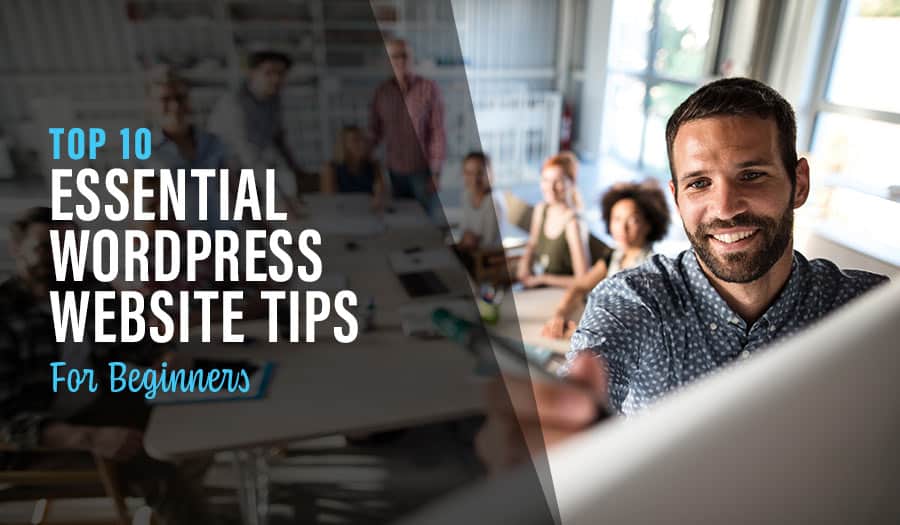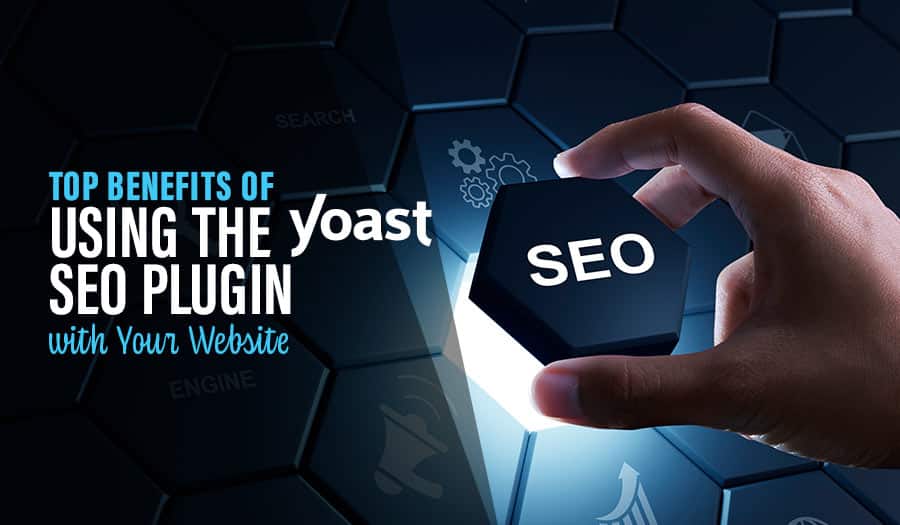Although WordPress is one of the best website publishing platforms available, the many features available to WordPress users can make starting a WordPress site feel overwhelming in the beginning. Fortunately, following a few basic guidelines allows you to master the learning curve and enjoy building your site on WordPress. Let’s explore the Top 10 Essential WordPress Tips For Beginners.
Top 10 Essential WordPress Tips For Beginners
- Choosing the right domain name
- Picking a plan that meets your needs
- Crafting your landing page
- Backing up your site
- Getting familiar with analytics
- Improving your site’s SEO
- Connecting to social networks
- Simplifying permalinks
- Setting up your site’s security
- Finding the right plugins
Here are our 10 essential WordPress tips for beginners.
10 Essential WordPress Tips For Beginners
1. Choosing the right domain name
There are several options for domain names, and the best name will depend on your website’s ultimate purpose. If you want a simple, free domain for a personal blog or another similar project, then you can easily choose a name with the format www.[yourwebsite].wordpress.com. Otherwise, you may wish to purchase your own domain name, which will allow you to forego the “.wordpress” tag behind your site’s name. In either case, choosing a domain name that’s short and relevant to your site’s content is beneficial.
What is the best domain extension for an Australian business?
For Australian businesses, .com.au is the best domain extension to choose for your website. This way, customers will know that the business is based in Australia and can more easily trust it. Additionally, search engines may give priority to .com.au websites when listing search results for users located in Australia.
2. Picking a plan that meets your needs
WordPress and some Web Designers offers a variety of support plans with varying features. Before you begin building your site, take some time to think about your budget and decide which features and level of support are right for your purposes.
Why is website support and maintenance important for a WordPress website?
Website support and maintenance are important for a WordPress website because they help keep the site secure and up-to-date. Regularly updating your site with security patches helps protect it from malicious attacks, while keeping plugins and themes up-to-date ensures that your content is always working as intended. Additionally, having a team of experts available to troubleshoot any issues can be invaluable in resolving issues quickly and efficiently. Regular maintenance also helps ensure that your site is performing optimally, helping to boost its ranking on search engine result pages. In short, website support and maintenance are essential for maintaining a safe and successful WordPress website.
3. Crafting your landing page
Your landing page is the first page your site visitors see, and you’ll want to put some thought into making it engaging and easy to navigate. It’s often a good idea to have an organised menu on your landing page to make the rest of the site easily accessible.
4. Backing up your site
You’ll be dedicating a lot of time and energy to your WordPress site, and backing up your content is important to ensure that your valuable content won’t be lost. Many plugins available will back up your site for you, including Updraft Plus, VaultPress, BackupBuddy, and many others.
What are the benefits of backing up your WordPress site regularly?
Backing up your site regularly will ensure that all of the content, plugins, and other data associated with it are safe from any potential threats. It also allows you to restore an older version of your website in case something goes wrong or there is a need to revert back to a previous version. Regular backups can also be used as a point of reference to see how the website has evolved over time. Additionally, if you ever need to move your site from one hosting provider to another, having regular backups will make this transition much simpler.
5. Getting familiar with analytics
Installing an analytics service such as Google Analytics will let you see who your web visitors are, and how they’re finding your site. This can help you visualise your site’s growth and decide how to market your site most effectively.
What are the Key metrics to review monthly with Google Analytics?
The key metrics to review monthly with Google Analytics include:
- Total visits, unique visitors, and pageviews. These metrics provide an understanding of the overall traffic of your website.
- Bounce rate is a good indicator of how well users are engaging with your content; lower bounce rates indicate that users are spending more time on your site.
6. Improving your site’s SEO
Improving your website’s Search Engine optimisation, or SEO makes it easier for web crawlers to find and index your website. Your site will rank better in search engine results, making it much easier to find. You can improve your SEO by consistently adding quality content and using relevant keywords for your site titles and descriptions.
What are some simple steps for improving your website’s SEO?
- Utilising targeted keywords within titles, metadata descriptions and alt text.
- Creating content that is relevant, accurate and high quality.
- Making sure to use appropriate headings and sections for organising the page’s content.
- Optimising URLs to be SEO friendly by including keywords in them.
- Linking to other related content on your website or other websites.
- Making sure to use images and videos with appropriate tags.
- Encouraging social sharing of the page’s content.
- Submitting a sitemap of your website to search engines.
- Regularly updating and refreshing content with new information.
- Creating an XML site map to help crawlers index
7. Connecting to social networks
Sharing your site’s content on social networks is an effective way to build your audience. Several WordPress themes automatically add social media buttons to your site, making it easy for your visitors to share your content.
What are the different ways to connect your website to your social media accounts?
- Use plugins or widgets to add social media buttons to each page of your website.
- Include links to all your social accounts in the footer of your website.
- Utilize cross-posting tools that automatically syndicate content from one network to another.
- Embed social media feeds into your website so
8. Simplifying permalinks
Permalinks are the web addresses that link to your website’s content. It’s essential to keep your permalink titles simple and relevant to the linked content.
What are some permalink best practices for SEO?
- Keep the structure of your permalinks short and sweet. For example, use “example.com/blog-post” instead of “example.com/category/subcategory/blog-post”
- Include keywords in the link that are relevant to the content, as this will help search engine
9. Setting up your site’s security
Aside from attracting your target audience, your site will undoubtedly attract a variety of spam and other unwanted attention. Installing plugins such as Akismet will help protect your site.
What are the top WordPress Security plugins?
The top WordPress security plugins include Wordfence, iThemes Security, and SecuPress. All of these plugins will provide your website with improved security by protecting against potential hacks, malware, and other malicious activity. They also provide features such as login protection and two-factor authentication for added safety.
10. Finding the right plugins
In addition to the plugins mentioned above, many starter plugins can improve your WordPress experience. One popular starter plugin is Jetpack, which provides several features, including security, analytics, and contact forms.
Tips on how to best review WordPress plugins
When researching potential plugins for your WordPress website, it’s important to check the reviews and ratings of each one. Read through the available support forums and documentation, as well as any other resources you can find online. Additionally, consider how often the plugin is updated – this will give you a good indication of its reliability. Finally, consider the cost of the plugin, which may or may not be worth it depending on your needs.
WordPress security is essential for a successful website. Fortunately, there are many tools available – both free and paid – to help you protect your WordPress site from malicious activity.
When is it time to go to a WordPress Website Expert?
Depending on your level of expertise with WordPress, hiring a professional to manage your website may be the best option. A good WordPress expert will provide comprehensive solutions to ensure the security and stability of your site. They can also offer tailored design services, plugin support and much more.
Although there are many resources available online to help you develop your own WordPress website, having an expert on hand to provide advice and support can really help to ensure your website runs smoothly.
Ultimately, the decision of whether or not to hire a WordPress Website Expert is up to you. If you need assistance with developing, managing or updating your website, then professional help may be worth considering.
Otherwise, you can
If you still have questions about starting your WordPress site, please contact us or visit our website for more assistance.
With our WordPress experience and specialisation in Web Design and Digital Marketing, we can help you find ways to get the most out of your site.
Let Sydney’s leading Web Design Agency take your business to the next level with a Pixel Fish Small Business Website.
Check out some of our latest Website Design projects.
More Reading
Top 10 reasons to choose WooCommerce for your business
What is Blogging? And how can it grow my business?
The Vital Role of Mobile Website Design
10 Best Practices for a Successful WordPress Website Design Project
Top 8 Advanced WordPress Features and Plugins to Beat Your Competition
How to Create a Landing Page for Your Small Business
Business Website SEO for Beginners
How to Run a Successful Business WordPress Website
Small Business SEO: Why Your Business Needs Google Analytics
An Introduction to Website Design for Small Business
Moving Your Business Domain Name Without Ruining Your SEO



